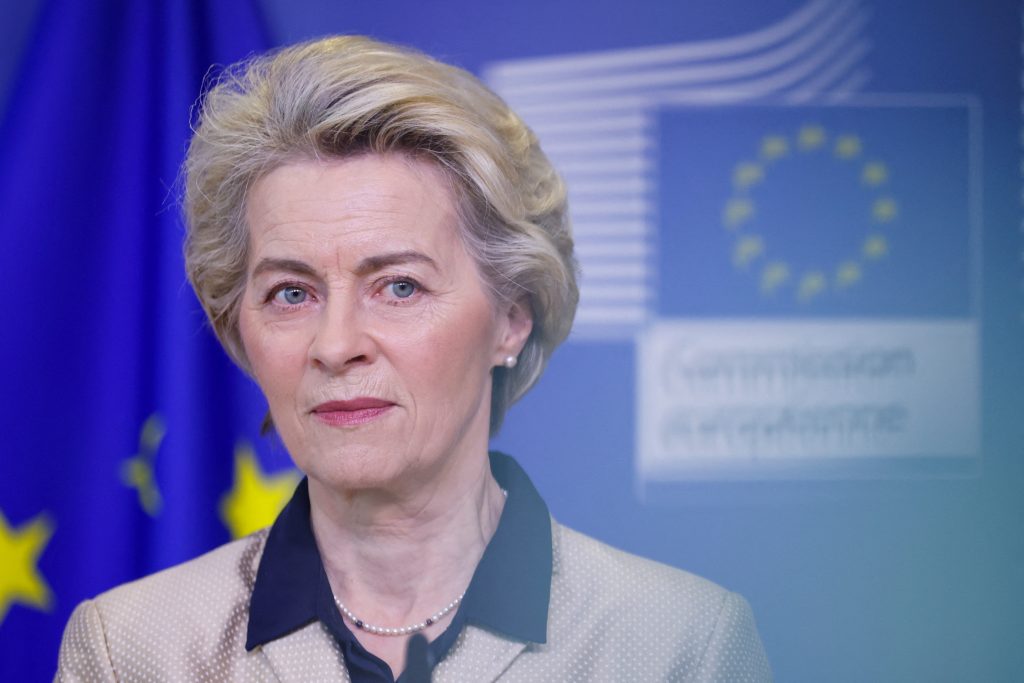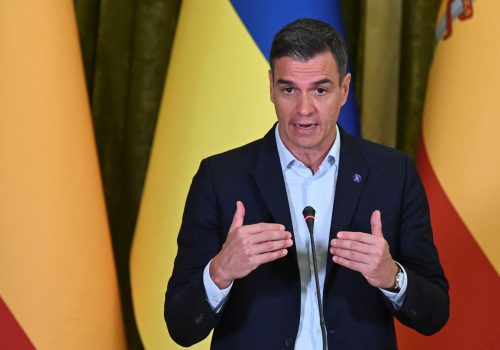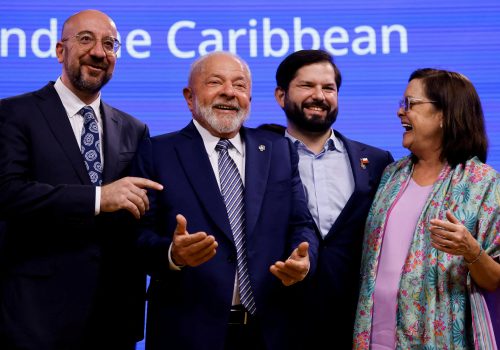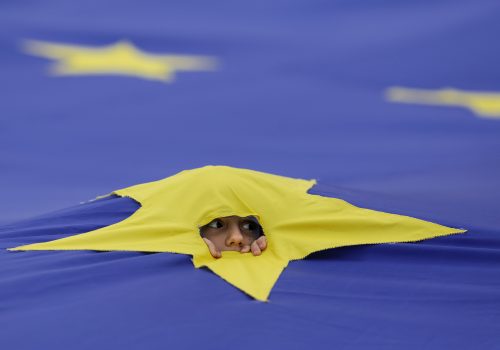At the risk of making too obvious of a point, 2019 is not 2023. In 2019, European Commission President Ursula von der Leyen entered office promising a “geopolitical Commission.” Since then, the European Union (EU) has faced one geopolitical crisis after another—a pandemic, a war in Europe, and intensifying energy and trade insecurities—and has embraced a newfound appreciation for geopolitics.
But it’s not over. The second half of 2023 poses four major tests that will reveal the realities of the EU’s geopolitical aspirations. These tests underscore a sense of urgency. Russia’s continued brutality in Ukraine and the specter of Chinese assertiveness, combined with the fact that Europe will pick a new Parliament and Commission in 2024—with US presidential elections not far behind—add pressure to deliver.
Test 1: Negotiations on steel and aluminum tariffs test transatlantic unity
US and European officials insist transatlantic relations are at an all-time high, but tensions over steel and aluminum tariffs risk upending the bonhomie. An approaching October deadline to resolve the issue will test the realities of Europe’s trade strategy with its biggest partner.
The steel and aluminum issue has been a concern for the entirety of the Biden and von der Leyen presidencies. The issue dates back to the Trump administration which, amid frustrations about excess steel and aluminum harming US producers, levied tariffs on European steel and aluminum imports, leading to an unceremonious transatlantic trade war. The Biden administration and EU pressed pause on the tariffs in October 2021, parking the dispute with negotiators to dream up a fix by this coming fall. Without a deal or some stopgap, however, tariffs will return. Negotiations are progressing slowly and will likely come down to the wire.
US and EU officials have every reason to find a compromise. The EU and United States rely on each other for trade, and Europe is undergoing a historic decoupling of its economies away from Russian energy and, simultaneously, attempting to “de-risk” from China. A sustainable relationship with partners such as the United States is essential in those efforts. Brussels can ill afford a trade war at the same time.
The negotiations are also a test for the EU’s open strategic autonomy. As the difficult negotiations highlight, trade and industrial policies have been one of the most challenging aspects of the US-EU relationship. The Biden administration has made clear it will “unapologetically” advance US industry and the green transition as matters of national urgency even if that goes against the interests of friends. The Inflation Reduction Act signed into law almost exactly a year ago made this painfully clear to Brussels. This has led the EU, a historic bastion of free trade since its single market came into being, to adopt more dirigiste policies to build up Europe’s own industrial capacity. Avoiding a trade war with Europe’s largest trading partner and advancing its own economic interests in negotiations with Washington will be critical for Europe’s economic plans.
Test 2: The EU-Mercosur deal measures the reach or limits of the EU’s “de-risking” strategy
Shortly before the July 17-18 summit between the EU and the Community of Latin American and Caribbean States (CELAC), von der Leyen pledged to conclude the long-awaited free trade deal with Mercosur countries Argentina, Brazil, Paraguay, and Uruguay by the end of the year. A deal would be a major deliverable in rebuilding Europe’s relationship with South America and a much-needed opportunity for Europe to diversify its trade partnerships.
Like most free trade agreements, the (sometimes literally) meat of the deal comes down to market access and politics. Europeans are worried about the impact on domestic farmers of South American agriculture, including beef, pushing down prices in the European market. Europe has also placed added emphasis on sustainability and climate neutrality, earning the ire of South American capitals. Negotiations are slow but progressing. Meetings on the sidelines of the EU-CELAC Summit appear to have been productive.
A deal before the end of the year would be an important signal that Europe can credibly engage with partners in the Global South and use those relationships to bolster Europe’s economic security. The EU is one of the Mercosur countries’ biggest trading and investment partners, but it has struggled to engage with the wider region and has been supplanted by China as South America’s chief partner apart from the United States.
Europe is looking for partners to rebalance an overreliance on Russia and China, expressed in the Commission’s proposed economic security strategy. Especially as the security of supply of critical raw materials—many of which are found in South America—sharpens European thinking about its trade relations, a deal represents a step forward for Europe in proving its vision of a free trade world is fit for purpose.
Test 3: Talks with Ukraine show if the EU is real about enlargement
Russia’s war in Ukraine breathed new life into the EU’s enlargement policy. In June 2022, Brussels decided to grant Ukraine “candidate status,” starting Kyiv on the road to membership. Formal negotiations could begin in December and would be an important signal of Europe’s commitment to Ukraine—and of Europe’s agency.
The pace of Ukraine’s EU accession has been blinding. Behind this speed is a recognition that Europe cannot afford gray zones on its borders and the EU itself is capable of providing security to Europe. While EU membership won’t supply the same security guarantees for Ukraine as NATO membership, the start of negotiations would show how determined the EU is to anchor Ukraine in Europe. It would also be the logical conclusion to the EU’s pledge of support to Kyiv for “as long as it takes,” building on the billions of euros in assistance to Ukraine it has sent so far, including the taboo-breaking provision of EU-funded military aid.
Ukraine’s entry into the EU will not be simple. Kyiv will need to align with the EU’s regulations on everything from agriculture to trade, budgets, transport, taxation, and more. Ukraine will also need to address the hard issues of tackling corruption and reforming its judicial system. Even in the face of Russia’s brutal invasion, Ukraine in the last year has still made progress on the conditions the Commission outlined, underscoring the seriousness of Ukraine’s EU aspirations. Ukraine will be responsible for keeping up its reforms, but starting negotiations this year is crucial to recognizing Ukraine’s progress and sustaining Ukraine’s EU aspirations as it encounters the daunting realities of entering the EU.
There is also a broader political dimension to Ukraine’s EU story: Enlargement also necessitates EU reform. The EU, Europe-watchers warn, cannot admit Ukraine without first altering internal EU structures and processes. Chiefly, this would likely require replacing unanimity in foreign policy decisions with qualified majority voting, by which 55 percent of EU member states representing at least 65 percent of the EU population could approve a decision. Others fret that Ukraine’s agricultural sector could derail the EU’s system of farm subsidies and collapse prices once Ukraine joins the single market.
It’s also not just about Ukraine. EU applicants in the Western Balkans have languished for years in Europe’s waiting room. Fast-tracking Ukraine at the cost of others risks further undermining the EU’s already-rocky credibility in that region. That said, delays, real or not, for Ukraine’s EU path would threaten momentum and be politically damaging to the legitimacy of the bloc.
Test 4: Negotiations on the AI Act will tell if the “Brussels effect” can meet the AI moment
The EU’s digital regulations are arguably the most impactful policies coming out of Brussels, and the AI Act will test the bloc’s staying power in tech regulation. The AI Act is the first of its kind to regulate the field of artificial intelligence (AI). It sets out Europe’s risk-based approach to the tech, adding oversight on high-risk AI and laying out which uses should be banned outright. The AI Act has been approved by both the European Parliament and Council of the European Union and heads into “trilogue” negotiations between the EU’s respective bodies to iron out the details of a combined version. Spain, the current holder of the EU Council presidency, has declared its ambition to finish negotiations during its tenure, which concludes at the end of the year.
The AI craze has attracted the attention of tech enthusiasts, luddites, and everyone in between. For policymakers, it carries the geopolitical potential to reshape economies and societies. How and when AI is used—including for things like policing, generating mis- or disinformation, social scoring, and more—all point to the need for action, especially when others such as China are crafting their own plans to dominate the space.
Europe should not take its foot off the gas. The faster the AI Act moves through the EU legislative process, the faster it can be adopted, and will help determine if the EU will be successful at regulating the space. At the same time, regulation alone will not position the EU to win an AI innovation race in which it is already lagging behind. The EU has also advanced a vision of digital sovereignty—or, in some critics’ eyes, protectionism—which will carry implications for the United States and its many AI companies leading the AI race. The AI Act’s final text will be important to measure how the EU is balancing its vision for the EU’s dominant position in the digital regulatory space and prove the bloc continues to set the agenda for the regulation of world-bending tech while creating the space for EU-based innovation and competitiveness in the AI field.
The last four years have not provided Brussels’ policymakers much rest. Constant crises have kept them on their toes and in their offices. Yet despite—or more likely because of—these crises, the EU has adopted a new geopolitical mindset and made moves to translate ambition into reality. How the EU meets the tests in the months ahead will be important to show that Europe can deliver.
Jörn Fleck is the senior director of the Atlantic Council’s Europe Center.
James Batchik is an assistant director with the Atlantic Council’s Europe Center.
Further reading
Mon, Jul 17, 2023
Five things to expect from Spain’s EU presidency
New Atlanticist By Lisa Homel, Marie Jourdain
Spain has an ambitious agenda for its EU presidency at a critical moment. But upcoming elections could upend it.
Wed, Jul 19, 2023
An eight-year diplomatic lull is over. So what did EU and Latin American and Caribbean leaders achieve?
New Atlanticist By Jason Marczak, Jörn Fleck
The EU-CELAC Summit in Brussels this week unleashed a newfound European commitment to the Americas. But what happens between now and 2025 will be decisive.
Fri, Jun 30, 2023
The next European Union member is…
New Atlanticist By
Ten years after Croatia joined the bloc—the last country to do so—Atlantic Council experts look at eleven countries that might join next.
Image: European Commission President Ursula von der Leyen attends a news conference in Brussels, Belgium February 16, 2023. REUTERS/Johanna Geron



